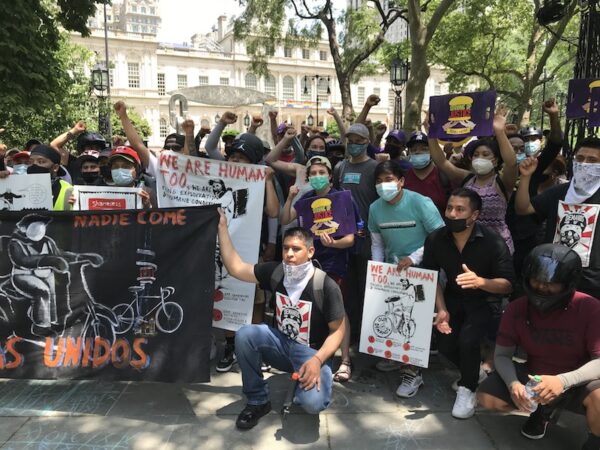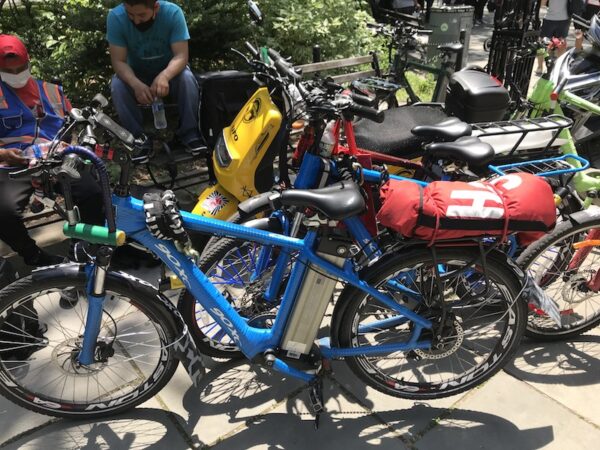
NEW YORK, N.Y.— Arrayed behind a phalanx of red, blue, and purple electric bicycles, several dozen workers for app-based food-delivery companies and supporters rallied in City Hall Park June 8, calling on the City Council to pass a six-bill package intended to improve their pay and working conditions – including one that would require restaurants to let them use the toilet when they’re picking up orders.
“The restaurants we work with should allow us to use their bathrooms,“ Mamadou, a 32-year-old immigrant from Mali who preferred not to give his last name, told LaborPress before the rally, which was organized by the Workers Justice Project’s Los Deliveristas Unidos campaign.
That’s the worst part of the job for women, especially in the summer when you have to drink a lot of fluids, added Pepe Jhonson, a Togolese immigrant who lives and works making deliveries in the Bronx.
The six bills also include a measure that would set minimum per-trip payments for the “deliveristas,” the heavily immigrant workers who deliver food for apps such as DoorDash, GrubHub, Relay, and UberEats. Others would require app companies to pay workers at least once a week and not charge them fees for collecting their wages; mandate that app companies and restaurants disclose how tips were divided; and enable workers to turn down too-long trips without being “deactivated” by the apps.
“We are the delivery workers who kept many businesses afloat,” deliverista Gustavo Ayche told the rally, speaking in Spanish. “We think we deserve essential protections.”
“Delivery workers have been feeding us, but the app companies have been starving them,” said City Councilmember Brad Lander (D-Brooklyn), sponsor of the minimum trip-fee bill. “These are not folks on a side hustle. They are working full-time.”
During the pandemic, he added, UberEats increased its cut of what customers pay from 11% to 14%, and DoorDash’s revenue quadrupled.
The pay is a major complaint for deliveristas. They get paid a flat fee per trip—$7 in Manhattan, $4-5 in the Bronx—say Mamadou and Jhonson, and, because the app companies define them as independent contractors, they get nothing when they’re not on a trip. The apps also sometimes keep tips or round the worker’s share down, such as from $5.65 to $5, Gustavo Mancilla told the crowd, and UberEats has a feature that enables customers to modify or cancel tips within an hour after delivery.

“The apps are not transparent,” he said.
Mamadou says he makes $15-20 an hour, working 10 hours a day. He seems to be an exception. In the Bronx, Jhonson says, speaking in French, “in one hour if you get 20 dollars, you are very happy.” She works 10 to 14 hours a day, and sometimes goes five hours without a delivery.
At a Council hearing on the bills later in the afternoon, Juan Reynoso, a Guatemalan immigrant with two children, told the Committee on Consumer Affairs and Business Licensing that he averages $10 an hour, working 10 to 12 hours a day, seven days a week.
Their income varies by day. On Mondays, Mancilla told LaborPress after the rally, he typically makes $40 to $60 for 10 hours. He lives in Washington Heights, began working food delivery four years ago after 10 years as a bar back, and has one child and another on the way. Last week, he says, he only worked 20 hours because some time slots were already full.
He shows a pay statement on his phone: $136.31.
Another issue, says Mamadou, is that the apps don’t tell workers where the destination is before they agree to take a delivery. “Is the pay that they show you going to be enough for you to take that job?” he asks.
The bills before the Council do not address security, which is a major concern for deliveristas. In the last year, 11 have been killed in accidents or robberies, Workers Justice Project executive director Ligia Guallpa testified at the Council hearing, reading their names.
The Bronx is “plus dangereux,” Jhonson says in French. Electric bikes are often stolen. They cost $1,800 or more and are a requirement for the job, says Mancilla.
About two dozen people from 32BJ SEIU turned out to support the deliveristas, as did Transport Workers Union organizing director Angelo Cucuzza. The TWU is supporting them, he says, “because they don’t have the ability to organize because of the structure of the laws and the behavior of the app companies.”
“All these bills should pass unanimously,” he added.
Later, he told the Council hearing that it was “almost absurd” that in 2021, there should be the need for a law to mandate that restaurants have to let delivery workers use their bathrooms.
One restaurant trade group agrees. Andrew Rigie, executive director of the New York Hospitality Alliance, told the Council that it was “common courtesy.” He asked that the bill be modified to give restaurant owners a warning before they are fined, and to give them time to set up policies.
State Senate Labor Committee chair Jessica Ramos (D-Queens) used her time before the committee to condemn a proposed bill that would give app-based workers limited “sectoral bargaining” rights, but would preserve their status as independent contractors instead of employees, bar them from going on strike, and pre-empt local laws such as the minimum wage New York City enacted for app-based taxi drivers in 2018.
“One of the most egregious parts of the so-called ‘right to bargain’ bill is that it undercuts delivery workers; local organizing efforts,” Ramos said.
That bill won’t come up this year, as it was not introduced before the Legislature’s deadline, the night of June 7.



